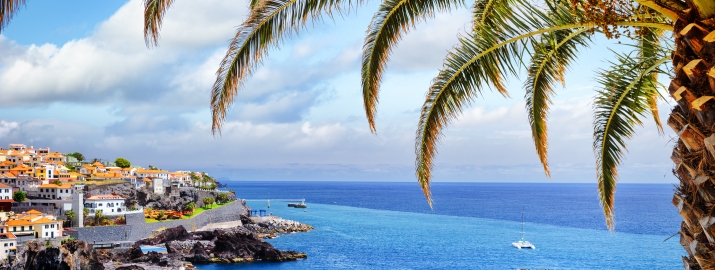
Retiring in Portugal: The Definitive Guide
You’ve worked hard all your life, paid your debts, and achieved financial independence. Now comes the sweet time to reap the benefits of your hard work: Retirement.
When people dream of retirement, they usually want to retire abroad. They look for a country that can offer them a high quality of life. They want somewhere with nice weather, perfect beaches, and the best healthcare quality. Sounds familiar?
As a prospective retiree, this is most probably your dream, too. So you go online, and search for “best places to retire,” and you find out that Portugal is always on top of the lists. In this guide, we will go through all the details you need to know about retiring to Portugal, including costs, best places to retire, taxes, and much more. Ready to explore?
Why Do Many Expats Choose to Retire in Portugal?
Portugal offers precisely what every retiree is looking for: Amazing beaches, friendly locals, excellent cuisine, and that old world charm mixed with the modern amenities of Western Europe. The bonus is that life in Portugal is slow and relaxed, which is simply excellent for retirement.
When expats choose to retire in Portugal, they often flock to the Algarve, also known as “The Golden Coast.” Both CNN and Forbes have published articles, praising The Algarve as the ideal location for retirement. Portugal is also the winner of the 2020 Annual Global Retirement Index.
What About The Cost of Living in Portugal?
You probably think such a high-quality life is expensive. The good news is it’s not in Portugal. Luckily, a couple can comfortably live in a small town in Portugal on €1,500-1,700 a month. If you prefer to live in larger cities, like Lisbon or Porto, this amount will go up to €1,700-1,900 a month.
Who Can Retire in Portugal: Residence Permits and Visas
The Portuguese government makes retiring in Portugal relatively easy. The Algarve region alone is home to over 100,000 retirees as of 2020. Quite a large number of those retirees are UK citizens.
When moving to Portugal, you’re going to need a visa and a residence permit. The requirements differ depending on your country of origin. Keep in mind that you’re also required to have a clean criminal record, as the Portuguese government runs a criminal background check during registration.
EU Citizens
If you’re from an EU country, it’s relatively easy for you to retire to Portugal. All you need to do is apply for residency in Portugal, and you’re going to have the same benefits a Portuguese citizen has.
All you need to do is go to a Servico de Estrangeiros e Fronteiras (SEF) office in Portugal and apply for residency. SEF is the official immigration service office of the Portuguese government.
US Citizens
US citizens can apply for a 120-day stay visa in Portugal. They’re required to provide proof of income, showing at least $1,070 monthly for the duration of their stay.
When you get to Portugal, you can apply for a one-year residence permit. SEF might require some extra documents such as proof of residence. After this one-year permit, you can renew your permit for a period of two years successively.
After five years of residence in Portugal, you become eligible to apply for permanent residency.
Sephardic Jews
If you have Jewish ancestry and prove it by documentation, Portugal grants you citizenship.
Portugal allows dual citizenship. This means that you can keep your original citizenship and receive Portuguese citizenship. This of course also depends on your country of origin’s regulations. So make sure to check the law before you apply for Portuguese citizenship.
Non-EU Citizens
For non-EU citizens, the process for a Portugal visa consists of some more steps. Before moving to Portugal, you’ll need to apply for a residence permit at the Portuguese consular office in your country of residence. For this, you’ll need the following documents:
- Valid passport
- Proof of health insurance which provides coverage in Portugal
- Criminal record
- Proof of income
You’ll receive a temporary permit after submitting the proper documents, which is typically valid for five years. After that, you’ll need to apply for permanent residence.
Another popular way to gain residence in Portugal is through The Portugal Golden Visa.
The Portugal Golden Visa
The Portugal Golden Visa is a residency by investment scheme, which can eventually lead to citizenship. The Portuguese government introduced this program in 2012 to draw foreign investors into Portugal. This program has been an astounding success, bringing over €5.5 billion worth of investment since 2012, and granted more than 15,500 residency visas.
To qualify for this program, you can choose one of the following investment routes:
- Acquire real estate with a minimum value of €500,000
- The minimum investment amount becomes €400,000 if the real estate property is in a low-density area
- Acquire real estate with a minimum value of €350,000 provided that the property is at least 30 years old and you renovate the property
- The minimum investment amount becomes €280,000 if the real estate property is in a low-density area
- Make a minimum capital transfer of €1 million into Portugal
- Create a minimum of 10 full-time jobs for Portuguese citizens
- Make a minimum capital investment of €350,000 towards a qualifying research and development activity
- Donate a minimum capital investment of €250,000 to arts, culture, or national heritage
- Invest a minimum of €350,000 in a qualifying investment fund
The Golden Visa gives you a residence permit for two years, which you can renew provided that you spend at least seven days in Portugal per year. After five years, you become eligible to apply for Portuguese citizenship. This is why this option is very popular among expat retirees. Also note that when you get Portugal Golden Visa, you’re going to have the right to visa-free travel around EU countries.
For a comprehensive understanding of the program, you can read our Portugal Golden Visa guide. This guide has been written by a community member who has experienced the program herself.
Taxes In Portugal
The Portuguese government changed many of the country’s retirement laws in 2009. The purpose of those changes is to make the country more attractive to foreign retirees.
Expats who retire in Portugal can enjoy the benefits of the Non-Habitual Resident Regime (NHR). The NHR allows non-residents to benefit from a discounted income tax rate instead of the standard Portuguese rate, which can go up to 48 percent.
You can become an NHR resident if you haven’t been a tax resident in Portugal for the last five years before your application. The NHR status exempts you from taxes for ten years on your following international incomes:
- Salary
- Business earnings
- Investment yields
- Rental income
- Capital gains
- Pensions
Furthermore, you’re also exempt from taxes on your wealth during this period. Any income earned in Portugal will be taxed at a flat 20 percent rate, instead of the regular income tax, which can be as high as 48 percent.
Moreover, tax residents in Portugal pay taxes on their worldwide income. You become a tax resident in Portugal if you live there for more than 183 days in any tax year. Additionally, all tax residents need to fill out their annual tax return to declare their income.
Portugal has Double Taxation Agreements (DTA) with all EU countries and many non-EU countries. The DTA prevents an individual from being taxed on their income in two countries. Check out the FAQs section for a list of countries that have a DTA with Portugal.
Inheritance tax
Fortunately, there is no inheritance tax on any real estate in Portugal. However, there is a stamp duty at a flat rate of 10%. Unless otherwise stated, grandchildren and spouses are exempt from this payment.
You may also be required to pay some small administrative fees while completing the inheritance process. The Portuguese civil code also states that “Any inheritance process shall be subject to the laws of the deceased’s home country.”
Inheritance laws can be a bit complicated. For example, if both spouses are from the same country, that country’s laws will apply. However, if the spouses are from different countries, Portuguese law may apply if the surviving spouse has a permanent residence in Portugal. This can be avoided by stating this in the will.
Therefore, it is advisable to hire a professional to help you with your will. They can ensure that you and your family receive the best treatment under tax law.
Retirement Funds, Pensions and Social Security
The retirement age in Portugal is 66 years and five months as of 2020. If you reside there and have at least 15 years of social security contributions under Portuguese employment, you can claim a Portuguese pension. Private pensions are also common in Portugal.
If they choose to retire in Portugal, EU citizens can easily transfer their contributions from any EU country to Portugal. The contributions they transfer will count towards their Portuguese state pension.
On the other hand, citizens from non-EU countries must contact their local state pension services to transfer their pension. Many non-EU countries have tax and social security agreements with Portugal, which can make this process easier.
As mentioned above, Portuguese residents are taxed on their worldwide income. This means that your pension paid internationally may be subject to tax in Portugal. However, this taxation can be avoided or reduced under the NHR regime.
Cost of Living in Portugal
Here comes the big question: “How much money do you need to retire in Portugal?”
Well, despite its high quality of living standards, Portugal stands out as one of the most affordable European countries. As mentioned at the beginning of the article, the cost of living in rural Portugal is cheaper than in the big cities.
Rental Prices in Portugal
Rental prices vary by location. Lisbon is the most expensive city. Here is a table of average rental prices in Lisbon:
| Circle Size | Women | Average price |
| One Bedroom | Town center | 1.100-2.000 € |
| Three Bedrooms | Town center | 2.000-3.700 € |
| One Bedroom | Outside the City Center | 700-1.300 € |
| Three Bedrooms | Outside the City Center | 1.200-2.400€ |
Be aware that in some districts of Lisbon, such as Avenida da Liberdade, Lapa and Baixa Chiado, prices are much higher than elsewhere due to high demand.
Food and Groceries
Food is quite affordable in Portugal, especially fruit, vegetables, fish and meat. This takes some of the pressure off the cost of living because grocery is a common cost everywhere.
Generally, a budget of €200-€300 will be enough for groceries. Here is a table showing the prices of various grocery items according to Numbeo:
| Grocery Stores | Price |
| Apple (one kg) | €2,01 |
| Banana (one kg) | €1,27 |
| Chicken (one kg) | €6,87 |
| A dozen eggs | €2,75 |
| A loaf of bread (500 g) | €1,36 |
| Local Cheese (one kg) | €10,07 |
| Milk (one liter) | €0,93 |
| Onion (one kg) | €1,74 |
| Potatoes (one kg) | €1,47 |
| Rice (one kg) | €1,38 |
| Water bottle (1.5 liters) | €0,69 |
A good bottle of wine in Portugal will cost around 10 euros, but if you are a wine collector you can also find some extremely rare wines that cost several thousand euros.
Eating Out
If you enjoy eating out at a good restaurant, the good news is that eating out in Portugal is quite affordable. Here is a table showing the average prices of eating out:
| Food/Product | Price |
| Eating at a cheap restaurant | €10 |
| Meal for two at a mid-range restaurant | €40 |
| Eating at a fast food chain | €6 |
| Bira | €2,50 |
| Water bottle | €1.16 |
Utilities
Utilities in Portugal also tend to be reasonably cheap. On average, expect to pay around €100-€150 per month for utilities. Of course, keep in mind that this depends on the size of your home, the season and your usage.
As for the internet, a 60 Mbps connection will cost around €35.
Public transport
Portugal has an impressive public transport network. The most common is buses. A single bus ticket costs €1.40. There are also many intercity buses.
You can find metro lines in Lisbon and Porto. These networks connect city centers to various neighborhoods and municipalities. There is also a famous tram line in both cities. Most metro tickets cost around €1, and you can get a weekly or monthly pass for €20-40.
Finally, taxi fares in Portugal are quite cheap, starting at 3 euros and increasing by 0.50 euros per kilometer.
Car Ownership
If you retire and move to Portugal and live in a large city like Lisbon, Cascais or Porto, you probably won’t need a personal car. In fact, if you do have a car, it’s hard to find parking in Lisbon.
However, if you live outside of these major cities, it is recommended that you have a car. Car drivers in Portugal have certain requirements, such as:
- Valid driver’s license
- Vehicle registration
- Reflective jacket (for driver and each passenger)
- Vehicle inspection certificate
- Headlight converters
- A spare set of glasses or contact lenses if the driver has a prescription
- First aid kit
- Spare bulbs
If the police stop you, they may ask to see any of the above items. If one or more of the above items are missing, you will be fined.
Petrol costs around 1.50 euros per litre and around 5.5 euros per gallon. LPG and diesel are cheaper.
Finally, you can also choose to rent a car, which costs around €30 per day. Keep in mind that tolls in Portugal are not cheap. For example, driving between Porto and Lisbon will cost around €30.
Health Care for Retirees in Portugal
Public healthcare in Portugal only covers foreigners with permanent residency, which means you will need private healthcare until you obtain your permanent residency.
Additionally, public healthcare is free for people over 65 or under 18. So if you’re retiring in Portugal, you’ll probably be covered by public health insurance, which is a plus. However, if you don’t qualify for public healthcare, you’ll need private healthcare.
Private Health Care
Fortunately, private insurance in Portugal is fairly cheap. A basic insurance package can cost between €19-45 per month, while a more comprehensive insurance package can cost about €75-95 a month. It’s important to note here that it’s easier to find English-speaking staff in private health institutions than in public ones. Keep in mind that it’s sometimes possible to extend your insurance in your home country to cover you in Portugal.
Public Healthcare
The public healthcare system in Portugal is called Serviço Nacional de Saúde (SNS). This system provides healthcare for free or at a minimal cost. There’s a collection of publicly funded hospitals and health centers under this system.
Banking in Portugal
Portugal has an excellent banking system, boasting over 150 banks in the country. There are private and public banks in Portugal, most of them belong to the Portuguese Banking Association.
We recommend that you open a bank account in Portugal if you’re planning your retirement there. Having a Portuguese bank account will make day-to-day activities, such as paying the bills, much easier. Additionally, if you work with international banking for everyday activities, you’ll spend a lot of money on transfer fees and currency exchange. This can be a lot of money wasted depending on the exchange rate between Portugal and your home country.
Before you open a bank account, you’ll need a NIF number.
Número de Identificação Fiscal (NIF)
The NIF number is basically a tax number that you need for any fiscal activities in Portugal. It will come in handy when opening utility bills, getting a phone number, buying properties, or any other official activities.
It’s actually quite simple to get a NIF number. All you need to do is go to the nearest tax office (Finanças) and provide them with the following documents:
- Passport or any valid identification
- Proof of address (the last utility bill would work)
Opening a Bank Account
After you obtain your NIF number, you can head to your preferred bank and give them the following documentation:
- Passport or valid identification
- Proof of address (the last utility bill would work)
- Portuguese NIF number
Keep in mind that some banks might ask for different documents, so it’s always a good idea to check on their website.
Banks in Portugal
Some popular private banks in Portugal are:
- Novobanco
- Millennium BCP
- BancoBIC
- Santander Totta
- Banco Best
- Banco BPI
Best Places for Retirement in Portugal
Portugal boasts a variety of regions and cities, each with its unique style and allure. Let’s take a deep dive into some popular retirement destinations in Portugal.
The Algarve
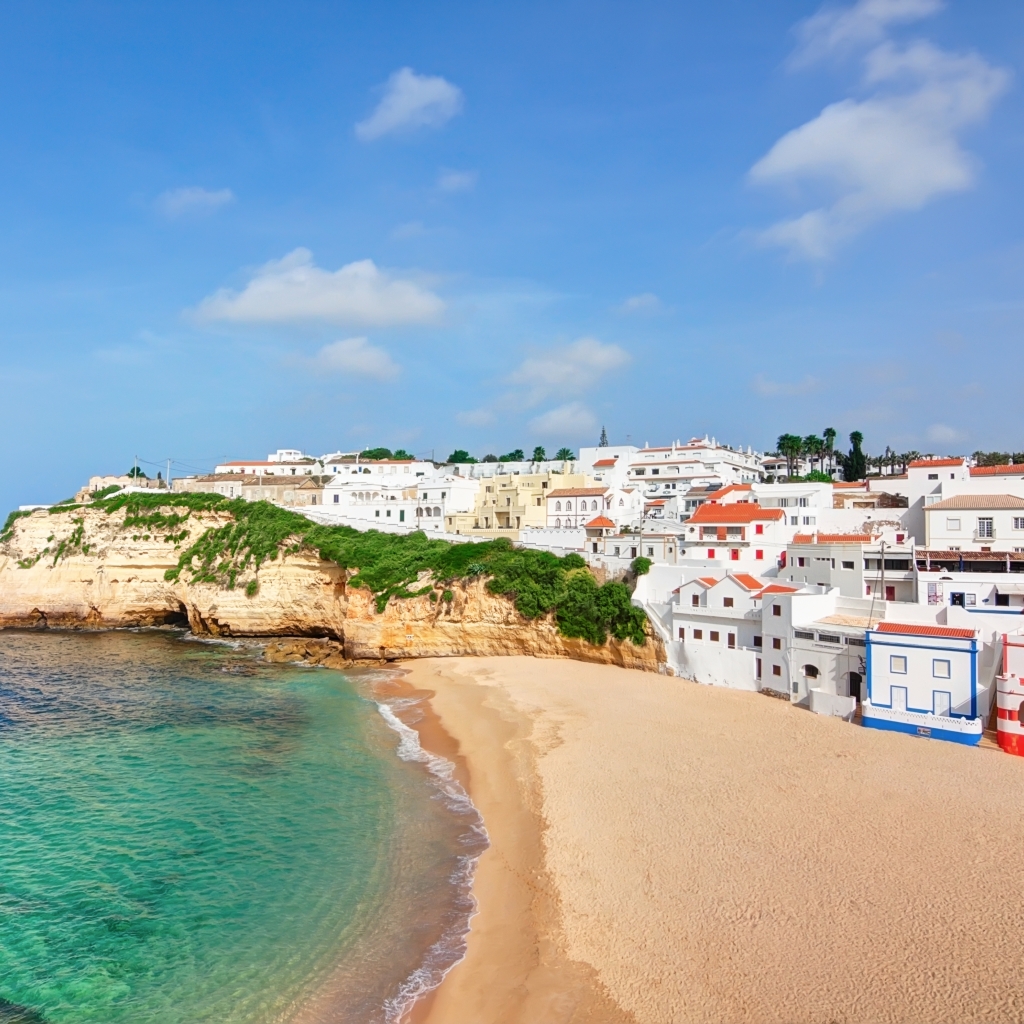
You simply can’t find a list of “best places to retire” that doesn’t mention The Algarve. The Algarve region is situated in southern Portugal, and it boasts more than a dozen towns and villages. The most popular amongst these villages are Lagoa, Faro, Albufeira, and Tavira. If you move further inland, Silves and Alvor will welcome you with open arms.
Forbes magazine rated The Algarve as one of the top places to retire in Europe in 2020, and why not? This region has pristine beaches, crystal clear waters, sunny weather all year round, and as a bonus, a massive collection of golf courses.
There are many expats in the region, and most locals have adapted to this, so you can easily get by on English alone. All of the above makes the Algarve amongst the top places to live in Portugal as an expat.
Porto
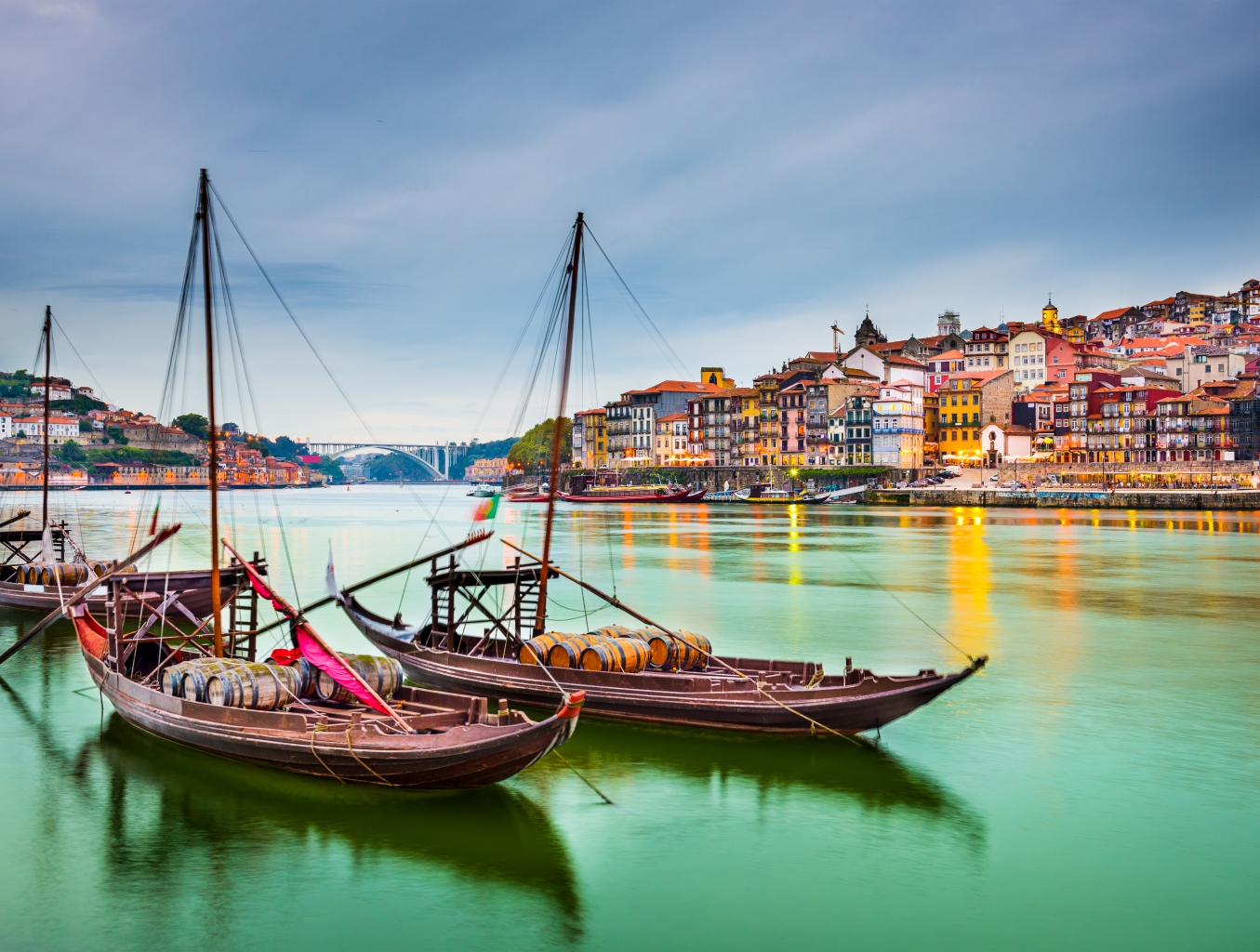
Americans moving to Portugal often choose Porto as their destination. Porto is the second-largest city in Portugal, and it’s unique in its traditional charm. Being a fishing town, Porto has excellent seafood cuisine, which provides you with a healthy and balanced diet. Additionally, Porto has that free old-world charm, making it an excellent choice for retirement.
Furthermore, Porto has a large number of expats, which means English is widely spoken. It’s also easy to make friends and establish social connections in the city. Porto’s only downside is that the winters can get a bit gloomy with lots of rain.
Lisbon
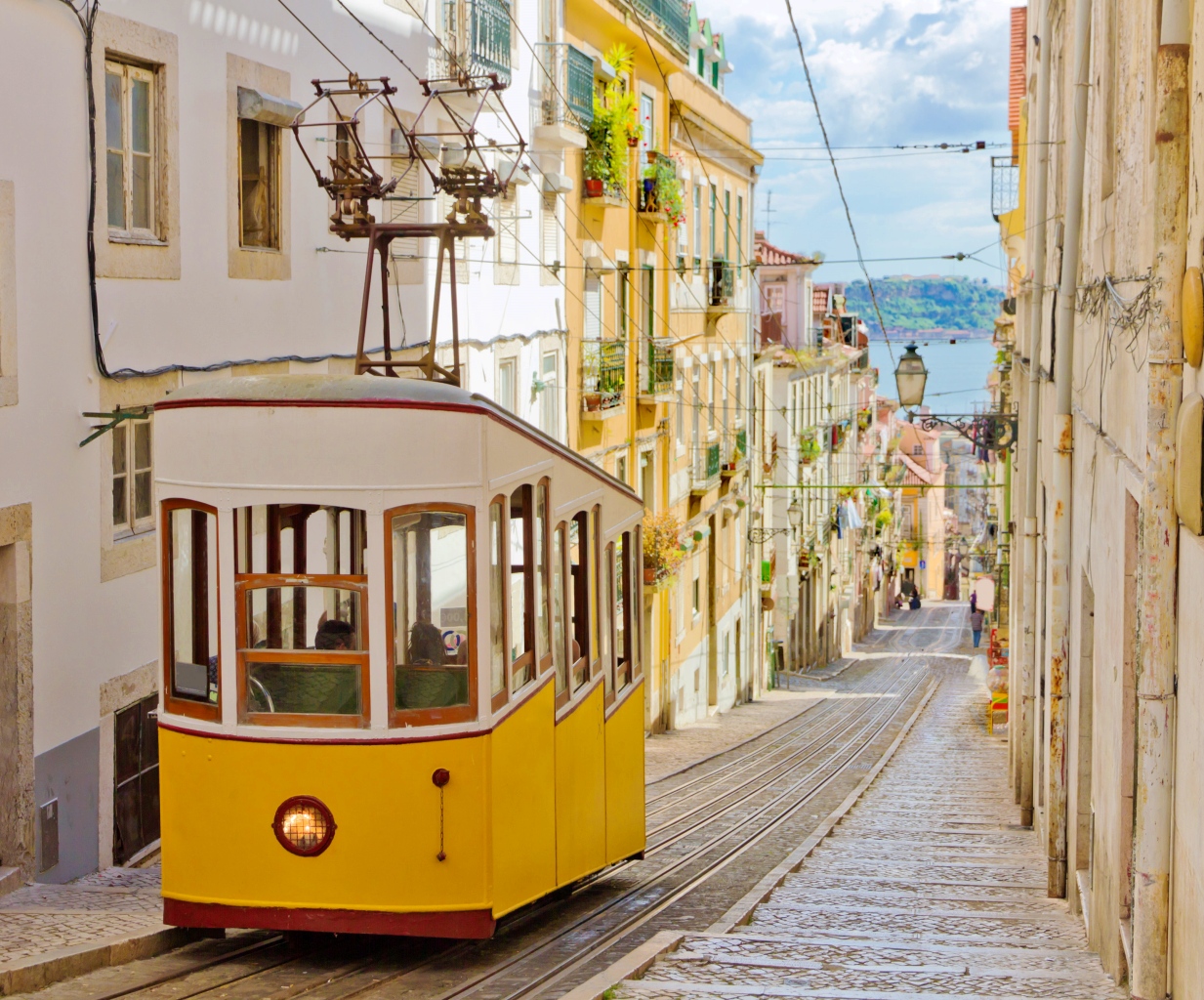
Most expats who move to Portugal turn their gaze to Lisbon. Lisbon is the beating heart of Portugal. This metropolitan city mixes all sorts of cultures seamlessly, like nowhere else in the world. Visitors, tourists, and expats flood into this city to live, work, study, or retire.
If you’re after the bustling life of a big city, then Lisbon is one of the best cities for that. It welcomes thrill-seekers in its lively neighborhoods boasting many bars and clubs. The quieter residential neighborhoods offer you a nice place to retire with your family.
The number of Lisbon neighborhoods is endless, and you can always discover new charming little places to visit.
Finally, you can definitely get by in Lisbon with English alone, as it’s basically the New York of Portugal. Some popular neighborhoods in Lisbon are Baixa, Chiado, Principe Real, Bairro Alto, and Campo de Ourique.
Cascais or Estoril
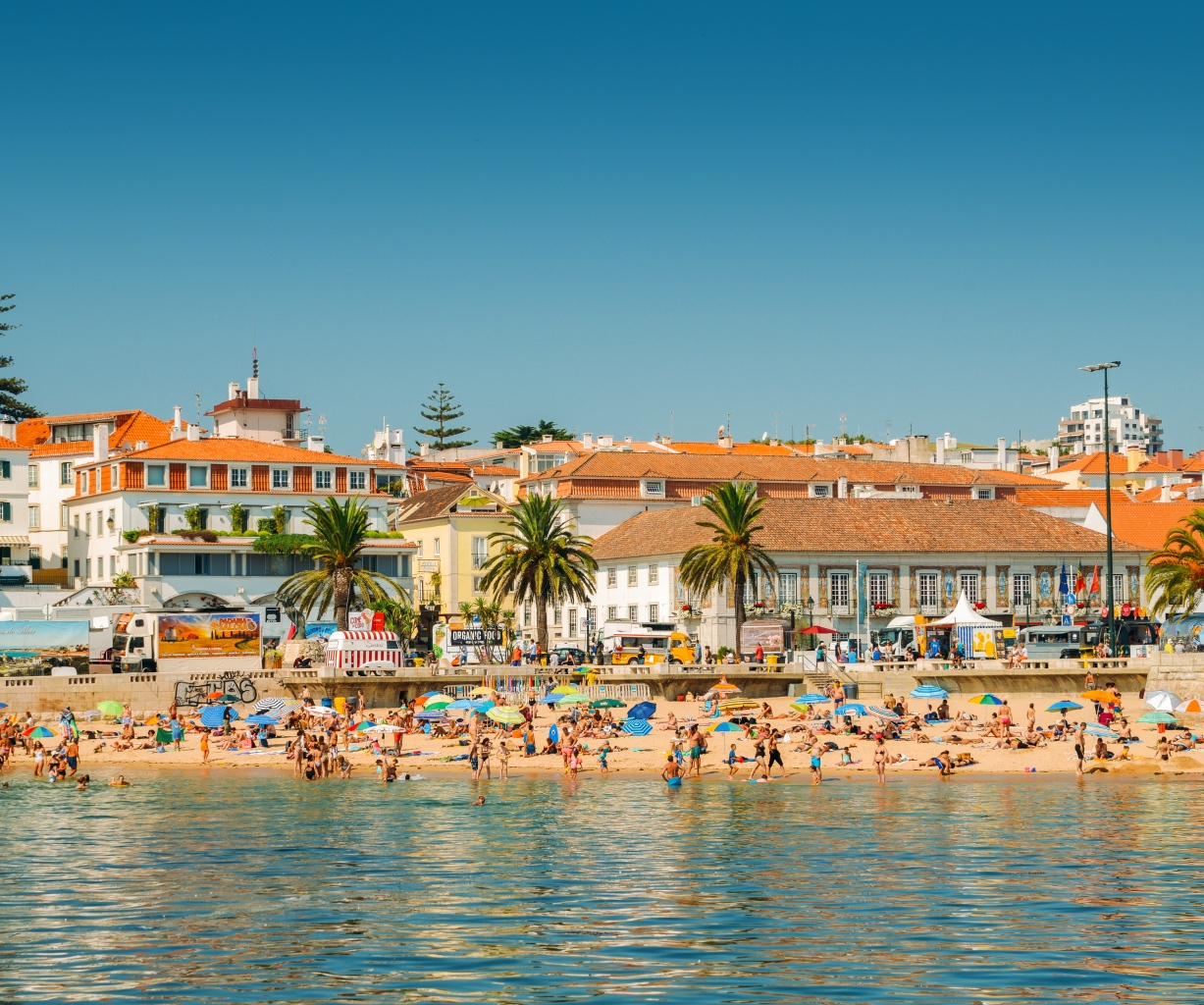
Cascais and Estoril are both coastal towns about half an hour’s drive from Lisbon. They’re just close enough to the big city to have modern amenities and just far enough to be peaceful and quiet. They can offer magnificent natural scenery and serene quiet beaches away from the hustle of the modern world.
As they’re close to the capital, more importantly to Lisbon’s airport, they are very well equipped with the best public services. It’s important to mention here that the property prices in these two towns have been climbing at a steady rate. This is why if you’re retiring in Portugal, you might want to grab your opportunity there sooner rather than later.
The Pros and Cons of Retiring To Portugal
You know the old adage, “Every rose has its thorns.” Portugal is definitely a rose when it comes to retiring, but it doesn’t come without a few thorns. Here’re the pros and cons of retiring in Portugal:
Pros
- Friendly local people and an open-minded culture
- Fantastic cuisine which is renowned for its variety and deliciousness
- Warm year-round weather in the coastal region
- Portugal cost of living is low compared to other European countries
- Highly beneficial taxing regimes for expats
- Life in Portugal is slow and breezy
- Portugal has one of the highest standards of living amongst European countries
Cons
- Public healthcare is only available for permanent residents
- The main language is Portuguese and not English
- Some public services and goods might be difficult to acquire in rural areas
- A complicated bureaucratic system that might take a while to understand
Summary
Portugal is an excellent country with one of the best standards of living at a low price. You can find whatever you’re looking for there, thanks to its variety of cultures, cuisine, and natural beauty. So, if you’re looking to retire somewhere abroad, you might want to choose to retire in Portugal.
FAQ
Healthcare is free for permanent residents in Portugal. It’s also free for seniors over the age of 65 and juniors and the age of 18. However, if you have a temporary residence in Portugal, you need private health insurance. Portugal’s private health insurance is cheap and can cost as low as $450 a year for a basic package.
Portugal has a very low cost of living. This means that your retirement will be comfortable in Portugal with that savings. A retired couple can live comfortably in Portugal for $1,500-2,000 per month.
Yes, the Portuguese government has no restrictions on foreigners buying a home in Portugal.
If you live in Portugal for more than 183 days in any tax year, you become a tax resident and have to pay taxes there. However, you can get many tax benefits from the NHR regime and pay fewer taxes as an expat.
Find the list of countries that have DTA with Portugal below:
| Countries That Have a DTA with Portugal | ||
| Algeria | Austria | Andorra |
| Bahrain | Barbados | Brazil |
| Bulgaria | Canada | Cape Verde |
| Chile | China | Colombia |
| Croatia | Cuba | Cyprus |
| Czech Republic | Denmark | East-Timor |
| Estonia | Ethiopia | Finland |
| France | Germany | Georgia |
| Greece | Guinea-Bissau | Hong Kong |
| Hungary | Iceland | India |
| Indonesia | Ireland | Israel |
| Italy | Ivory Coast | Japan |
| Kuwait | Latvia | Lithuania |
| Luxembourg | Macau | Malta |
| Mexico | Moldova | Montenegro |
| Morocco | Mozambique | Netherlands |
| Norway | Oman | Pakistan |
| Panama | Peru | Poland |
| Romania | Russia | San Marino |
| São Tomé and Principe | Saudi Arabia | Senegal |
| Singapore | Slovakia | Slovenia |
| South Africa | South Korea | Spain |
| Qatar | Sweden | Switzerland |
| Tunisia | Turkey | United Arab Emirates |
| United States of America | United Kingdom | Ukraine |
| Uruguay | Venezuela | Vietnam |
